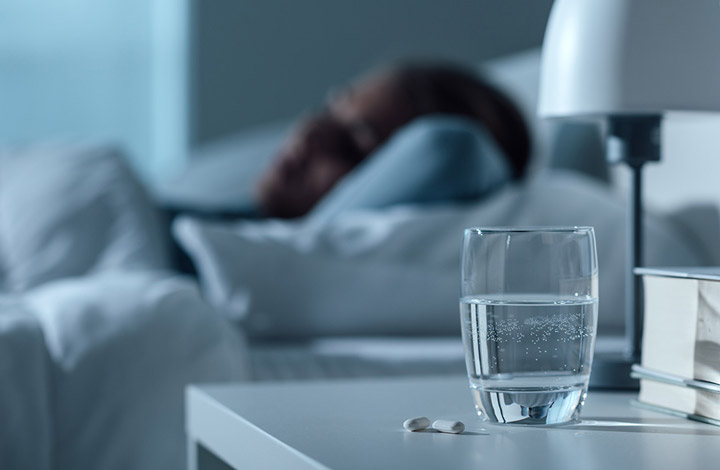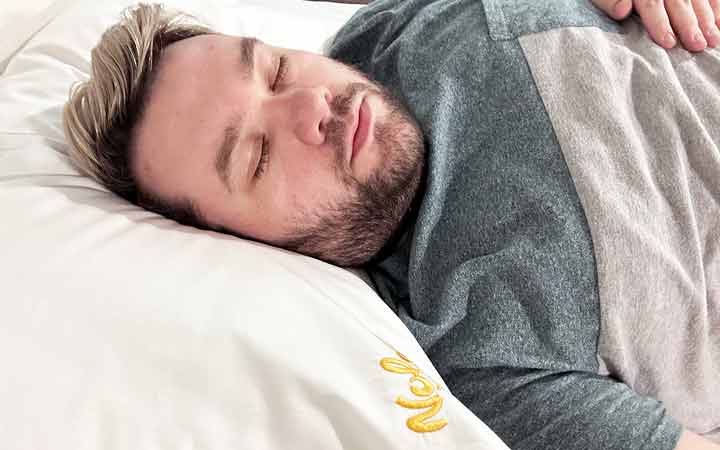For a biological process that ideally takes up a third of our lives, sleep can be painfully difficult for many people. The Cleveland Clinic reports that “roughly, one in three adults worldwide have insomnia symptoms, and about 10% of adults meet the criteria for insomnia disorder.”
Considering the importance of getting enough sleep, it’s no surprise that many people resort to sleeping pills. But how safe are sleeping pills, and can you overdose on them? Read on to learn more about the dangers of sleeping pill overdoses, the risks and side effects of sleeping pills and how to safely use these medications.
A sleeping pill overdose is a medical emergency that requires immediate attention. If you are concerned you or a loved one has overdosed on sleeping pills, dial 911.
Can You Overdose on Sleeping Pills?
Even though sleeping pills are a commonly used medication, you can absolutely overdose on them. Most prescription sleeping pills work by depressing the central nervous system. As a result, taking too many pills or mixing them with another depressant can cause respiratory depression, coma and even death.

Which Sleeping Pills are Dangerous?
Prescription sleeping pills are the most dangerous. The three most common types of prescription sleeping pills are:
- Antidepressants: Doctors prescribe certain antidepressants, such as trazodone (Desyrel), doxepin (Silenor) and amitriptyline (Elavil) to help combat insomnia. These are not technically sleeping pills but can promote relaxation and sleep.
- Benzodiazepines: Benzodiazepines such as Xanax, Valium and Ativan are common sedative sleeping pills. Their primary use is in anxiety disorder treatment, and they work by enhancing GABA activity (a neurotransmitter that calms the brain and promotes sleep).
- Z-drugs: Also known as non-benzodiazepine sedatives, drugs in this group, such as eszopiclone (Lunesta), zaleplon (Sonata) and zolpidem (Ambien) are other common sleeping pills with sedative properties.
Of these, benzodiazepines and Z-drugs carry the most risk of severe side effects. Z-drugs are popular largely because they were developed as a safer alternative to benzodiazepines, but ongoing research suggests that both drugs may be equally dangerous.
Both benzodiazepines and Z-drugs are particularly dangerous because they can cause respiratory depression and even death if taken in high doses. Because they are sedatives, it is hazardous to mix them with other depressants like alcohol and opiates.
Are Sleeping Pills Addictive?
One of the main reasons medical professionals recommend that you only take sleeping pills for two to four weeks is that they are addictive. Both benzodiazepines and Z-drugs carry a high risk of dependency and withdrawal.
What Happens If You Take Sleeping Pills Every Day?
Taking sleeping pills every day can lead to dependence and tolerance. Physical dependence occurs when your body stops producing hormones or neurotransmitters as it normally would because of the role the drug plays in your body. Tolerance occurs when you become accustomed to the sleeping pill and require higher and higher doses to achieve the same effect.
Withdrawing from sleeping pills suddenly or too quickly can lead to withdrawal symptoms and rebound insomnia, in which your insomnia returns once you stop taking the medication. These factors can lead to addiction. If you believe you have grown dependent upon or tolerant to sleeping pills, let your doctor know, and they can work with you to safely wean off your medication.
How Many Sleeping Pills Can You Take Safely?
The number of sleeping pills you can take safely depends on many factors, including the drug in question, your physical makeup, and any other medications you take. Therefore, it is best to follow your prescription or the instructions on an over-the-counter label exactly and to contact your doctor if questions arise.
What Happens If You Overdose on Sleeping Pills: Emergency Treatment
If you overdose on sleeping pills, it is critical that you immediately seek out emergency care. Symptoms that may indicate an overdose include:
- Confusion
- Dizziness
- Extreme drowsiness
- Respiratory distress
Medical treatment of a sleeping pill overdose occurs in the hospital and may involve a combination of the following:
- Activated charcoal: You may have to drink a charcoal-based liquid. This binds to the medication in your stomach, preventing it from entering the bloodstream.
- Stomach pump: Having your stomach pumped involves flushing out the stomach’s contents with a tube.
- Administration of medications: Some medications can help to flush the drug out of your system.
Depending on the severity of your symptoms, doctors may also place you on a respirator or perform dialysis. Intravenous fluids help combat dehydration and stabilize your body’s functions. You will likely also consult a psychiatric professional to determine whether you need mental health or addiction treatment.
Sleeping pills are sometimes sought out by people who are contemplating suicide. If you or someone you know is in crisis, please remember that there are people who want to help you. For immediate help, you can call the National Suicide Prevention Lifeline at 1-800-273-TALK (1-800-273-8255) or text “HOME” to 741741.
How Do Sleeping Pills Work?
Sleeping pills work by targeting and altering brain processes related to sleep. Harvard Health Publishing explains that both benzodiazepines and Z-drugs enhance the activity of a neurotransmitter called gamma-aminobutyric acid (GABA), which reduces activity in the central nervous system. This reduction is what causes you to feel sleepy and relaxed.
How Long Do Sleeping Pills Take to Kick In?
Sleeping pills do not work instantaneously, so it is important to establish a routine if you take them. It can take benzodiazepines 30–60 minutes to begin working, while Z-drugs take closer to 15–30 minutes.
Plan to take your sleeping pill soon before bed, but provide yourself with some extra time for the medication to start working. Do not take additional pills or other sleeping aids if you feel your pill is not working. Instead, talk to your doctor or other medical professional to discuss changing your medication or dosage.
How Long Do Sleeping Pills Make You Sleep?
The duration of sleep following a sleeping pill varies from person to person and depends on what type of medication you take. Your doctor will prescribe a dose that should ideally help you sleep for the recommended 7–9 hours. However, many patients who take sleeping pills feel tired the next day.

Types of Sleeping Pills
Up to this point, we have focused primarily on prescription sleeping pills, as they carry the highest overdose risk. However, there are many types of sleeping aids.
Natural Sleeping Pills
People looking to get more sleep without resorting to prescription medication may opt for natural sleep aids.
Natural sleeping pills include:
- Melatonin: Melatonin is a hormone your body naturally produces as part of your sleep-wake cycle to induce drowsiness. Melatonin comes in a wide range of doses, so taking the lowest dose effective for you is best.
- Valerian root: Valerian root is an herbal supplement that may promote sleep.
Remember that just because something is natural does not mean it is safe. In fact, the American Academy of Sleep Medicine recommends against using natural sleep aids, including melatonin and valerian root, when treating chronic insomnia.
Prescription Sleeping Pills
Prescription sleeping pills take many forms and include:
- Benzodiazepines
- Non-benzodiazepine hypnotics, known as Z-drugs
- Off-label antidepressants
- Orexin receptor agonists, such as Belsomra
- Antiseizure medications, such as gabapentin (primarily to treat restless legs syndrome)
Risks and Side Effects of Sleeping Pills
Sleeping pills carry a number of risks, which is another reason long-term use is not advised.
Common sleeping pill side effects include:
- Headache
- Nausea
- Dizziness
- Daytime drowsiness
- Constipation or diarrhea
- Dry mouth
Serious side effects for which you should seek medical attention include:
- Memory loss
- Parasomnia (sleepwalking, sleep eating, bedwetting)
- Respiratory depression or difficulty breathing
- Allergic reaction
In addition to these side effects, the risks of addiction and dependence are high. Because most prescription pills are depressants, it is also extremely dangerous to use them alongside other depressants such as alcohol or opiates. If you are having trouble stopping your use of sleeping pills, please reach out to your doctor or an addiction center.
Who Should Avoid Sleeping Pills?
The Mayo Clinic notes that both prescription sleeping pills and some non-prescription sleeping aids may not be safe for everyone. In particular, pregnant, breastfeeding or older adults should exercise caution and talk with their healthcare provider about the risks of sleeping pills.
Because sleeping pills increase your risk of falling due to drowsiness, dizziness and sleepwalking, older adults are at a higher risk of injury when taking these medications.
In addition, options for sleep aids may be limited if you have kidney disease, liver disease, low blood pressure, heart rhythm problems or a history of seizures. Many medications interact with sleeping pills, so you should talk to your provider and pharmacist about potential interactions.

How to Sleep Without Sleeping Pills
Sleeping pills are a short-term solution to a potentially long-term problem. To avoid becoming dependent on sleeping pills or living a life of sleep deprivation, learning how to sleep without sleeping pills is crucial.
The American Academy of Sleep Medicine strongly recommends using cognitive behavioral therapy for insomnia (CBT-I). They explain that “CBT-I combines one or more cognitive therapy strategies with education about sleep regulation plus behavioral strategies such as stimulus control instructions and sleep restriction therapy. Treatment typically involves four to eight sessions.”
You can also take steps on your own to improve your sleep by improving your sleep hygiene. Sleep hygiene involves a combination of environmental and behavioral changes that you make to optimize sleep:
- Only use your bedroom for sleep and sex
- Stop using electronic screens at least 30 minutes before bed
- Avoid alcohol, caffeine, spicy foods, and other food and drinks that keep you from falling and staying asleep
- Maintain a cool bedroom temperature
- Establish a bedtime and wake up at the same time every day
- Stop drinking liquids two hours before bed to avoid waking up to use the bathroom
- Sleep on a comfortable mattress
If your mind races the moment you lie down to sleep, sleep apps can be beneficial. Whether you want to listen to a bedtime story, ambient noise, or a sleep meditation, the best sleep apps can help. You can also prepare for bedtime with an anti-energy drink, some of which include low doses of herbal sleep remedies.
Sometimes you may encounter a night when you simply cannot sleep. In these cases, experts recommend waiting 20 minutes after you notice you’re having trouble falling asleep, and then getting up if you are still awake. Then, try reading a book, meditating, listening to music or practicing deep breathing techniques to get yourself back to sleep.
FAQs
Is melatonin a sleeping pill?
Melatonin is a hormone your body produces to help regulate the sleep-wake cycle. When taken orally, melatonin can make you tired and help with falling asleep. However, it is not considered a traditional sleeping pill.
How long after drinking can you take sleeping pills?
Doctors generally recommend that people taking sleeping pills refrain from alcohol because the combination can prove deadly. Additionally, while some people use alcohol to help them fall asleep, it actually results in poor sleep.
What is the safest sleeping pill for the elderly?
Older adults should speak with their physician about the right sleeping pill for them. Some studies suggest that Z-drugs may be safer than benzodiazepines for seniors because of a lower risk of dependence and cognitive impairment, but this is disputed within the medical community.
Can you take sleeping pills while pregnant?
While doctors generally do not recommend taking sleeping pills while pregnant, as the fetus will absorb some of the medication, providers can prescribe a short-term round of a low-dose sleeping pill if needed.
Do sleeping pills cause dementia?
Some research suggests a correlation between the long-term use of sleeping pills and an increased risk of dementia. However, such correlations may be due to common factors that cause both insomnia and dementia rather than due to the medication itself.

